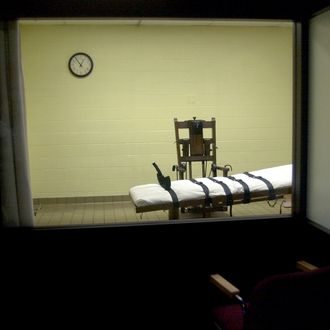
Twenty-eight prisoners were executed in America in 2015, the lowest number since the early ‘90s, according to the newest annual report from the Death Penalty Information Center. Only 49 new death sentences were issued — a dramatic decrease from 1996, when 315 death sentences were tallied.
Those 28 deaths took place in only six states, and nearly half of them happened in Texas. In the rest of the country, executions have become a practical, or philosophical hindrance, at least for now — something that becomes very obvious when you look at the biggest stories about capital punishment that have happened in the past year or so.
Oklahoma — one of the states that usually nears the top of the charts when it comes to the death penalty — executed one person this year. The slowdown took place a few months after the slow, excruciating death of Clayton Lockett; prison officials were forced to use an untested drug cocktail for the lethal injection, and the IV may have been placed incorrectly. Future executions were postponed, and the Supreme Court considered if the use of the drugs used in Lockett’s execution and other botched executions was cruel and unusual punishment. The Court said no, but justices Stephen Breyer and Ruth Bader Ginsburg said in a dissent that “Rather than try to patch up the death penalty’s legal wounds one at a time. I would ask for full briefing on a more basic question: whether the death penalty violates the Constitution.” Pope Francis, when addressing Congress this year, also said he supports abolishing the death penalty.
All executions are on hold in Oklahoma after the state realized it messed up the only execution it carried out this year.
The issue of lethal-injection drugs — and the difficulty that states have in procuring them — is a big driver in the drop in executions. Many pharmaceutical companies are unwilling to sell drugs used in executions to states, and some companies have simply stopped producing them altogether. Ohio, which executed no prisoners this year, has put all future executions on hold until at least 2017 because the state can’t find enough of the drugs necessary for executions. The last prisoner killed in Ohio took 26 minutes to die.
According to the Columbus Dispatch:
Ohio legislators passed a law allowing the Ohio Department of Rehabilitation and Correction to secretly contract with ‘compounding pharmacies’ that mix drugs to client specifications. No pharmacies came forward to take the state’s drug business. Ohio prison officials are now pushing federal regulators to allow them to legally purchase sodium thiopental from overseas for executions. The U.S. Department of Health and Human Services is balking, but hasn’t officially closed the door. Shipments of the drug destined for Arizona and Texas were seized by the federal government.
It’s also hard to get the necessary drugs internationally. The European Union refuses to send drugs destined for the death penalty to the U.S. anymore. Some states have tried to make the name of the drug companies or medical professionals taking part in executions a secret, which did little to convince anyone this was a good business practice.
Some states are legislating backup execution methods, in case lethal injection becomes logistically impossible forever. In Utah, firing squads are legal again. However, those don’t always work either. In 1879, an execution in Utah ended with the prisoner yelling, “Oh, my God! My God! They have missed.”
It’s also hard to get the necessary drugs internationally. The European Union refuses to send drugs destined for the death penalty to the U.S. anymore. Some states have tried to make the name of the drug companies or medical professionals taking part in executions a secret, which did little to convince anyone this was a good business practice.
Some states are legislating backup execution methods, in case lethal injection becomes logistically impossible forever. In Utah, firing squads are legal again. However, those don’t always work either. In 1879, an execution in Utah ended with the prisoner yelling, “Oh, my God! My God! They have missed.”
In Connecticut, the State Supreme Court said it would be unconstitutional to execute the 11 prisoners still on death row in the state; the death penalty was outlawed there three years ago. Nebraska legislators outlawed the death penalty this year, but enough death-penalty supporters gathered signatures to send the issue to the ballot next year. No executions will take place in the state until the issue is resolved.
According to a Gallup poll from October, 61 percent of Americans support the death penalty. That number looks like an incredibly solid majority, but for context, remember that 80 percent of Americans supported the death penalty in 1994, near the height of the Clinton-era crime worries.
Sources
Columbus DispatchWe know that the government has its reasons for seeking the death penalty, but the continued pursuit of that punishment could bring years of appeals and prolong reliving the most painful day of our lives. We hope our two remaining children do not have to grow up with the lingering, painful reminder of what the defendant took from them, which years of appeals would undoubtedly bring … The minute the defendant fades from our newspapers and TV screens is the minute we begin the process of rebuilding our lives and our family.





























